Living on the brink in orkshire & Humberside
Page 27
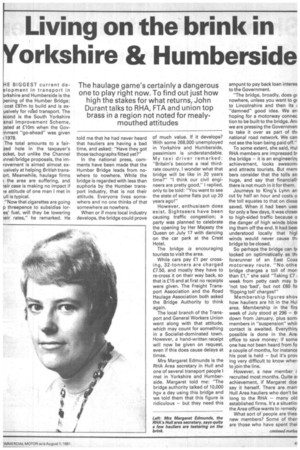
Page 28
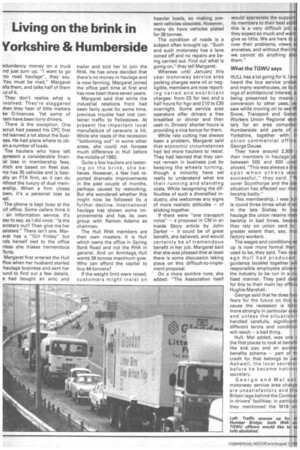
Page 29
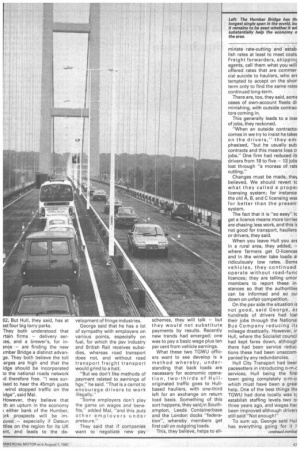
Page 30
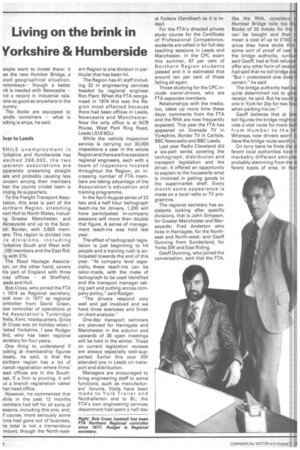
Page 31
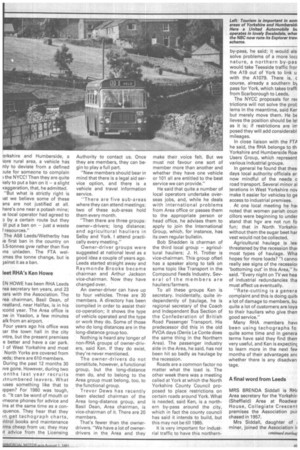
Page 32
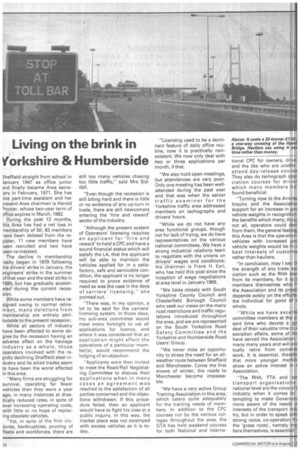
If you've noticed an error in this article please click here to report it so we can fix it.
The haulage game's certainly a dangerous one to play right now. To find out just how high the stakes for what returns, John Durant talks to RHA, FTA and union top brass in a region not noted for mealymouthed attitudes
HE BIGGEST current delopment in transport in rkshire and Humberside is the ening of the Humber Bridge; cost £87m to build and is exusively for read transport. The acond is the South Yorkshire anal Improvement Scheme, Dsted at E10m when the Govrnment "go-ahead" was given 1978.
The total amounts to a fairzed hole in the taxpayer's ocket, but unlike the Channel lnneltbridge proposals, the imrovement is aimed almost exusively at helping British transort. Meanwhile, haulage firms
the area are suffering, and leir case is making no impact if le attitude of one man I met in ull is typical.
"Now that cigarettes are going p threepence to subsidise lores' fuel, will they be lowering ieir rates," he remarked. He told me that he had never heard that hauliers are having a bad time, and asked: "Have they got those tachographs fitted yet?"
In the national press, comments have been made that the Humber Bridge leads from nowhere to nowhere. While the bridge is regarded with less than euphoria by the Humber transport industry, that is not their attitude. Everyone lives somewhere and no one thinks of that somewhere as nowhere.
When or if more local industry develops, the bridge could prove of much value. If it develops? With some 268,000 unemployed in Yorkshire and Humberside, pessimism is understandable. My taxi driver remarked: "Britain's become a real thirdrate country. I wonder what that bridge will be like in 20 years time?" "I think our civil engineers are pretty good," I replied, only to be told: "You want to see the state of some flats put up 20 years ago!"
However, enthusiasm does exist. Sightseers have been causing traffic congestion; a party was planned to celebrate the opening by Her Majesty the Queen on July 17 with dancing on the car park at the Crest Hotel.
The bridge is encouraging tourists to visit the area.
While cars pay £1 per crossing, 32-tonners are charged 0.50, and mostly they have to re-cross it on their way back, so that is £15 and at first no receipts were given. The Freight Transport Association and the Road Haulage Association both asked the Bridge Authority to think again.
The local branch of the Transport and General Workers Union went along with that attitude, which may count for something in a Socialist-dominated town. However, a hand-written receipt will now be given on request, even if this does cause delays at times.
Mrs Margaret Edmunds is the RHA Area secretary in Hull and one of several transport people I met in Yorkshire and Humberside. Margaret told me: "The bridge authority talked of 10,000 hgv a day using this bridge and we told them that this figure is ridiculous — but they need this amount to pay back loan interes to the Government.
"The bridge, broadly, does gc nowhere, unless you want to gc to Lincolnshire and then its "damned" good idea. We an hoping for a motorway connec tion to be built to the bridge. An we are pressing the Governmen to take it over as part of till national road network. We can not see the loan being paid off."
To some extent, she said, Hul RHA members are impressed b, the bridge — it is an engineerim achievement, looks awesorni and attracts tourists. But mem bers consider that the tolls an huge, and say that financial', there is not much in it for them.
Journeys to King's Lynn an cut by half an hour and costs o the toll equates to that on diese saved. When it had been use( for only a few days, it was close( to high-sided traffic because o the danger of high winds blow ing them off the end. It had beei understood locally that higl winds would never cause MI bridge to be closed.
So perhaps the bridge can bi looked on optimistically as thi forerunner of an East Coas motorway route. "No othe bridge charges a toll of mon than £1," she said "Taking £7 week from petty cash may bi 'not too 'bad', but not £60 fo 'flipping toll' charges!"
Membership figures shov how hauliers are hit in the Hul area. Membership in the firs week of July stood at 296 — 61 down from January, plus sorni members in "suspension" whill contact is awaited. Everythira possible is done in the Are office to save money; if some one has not been heard from fo a couple of months, for instance his post is held — but it's prov ing very difficult to know when to join the line.
However, a new member i recruited most months. Quite ai achievement, if Margaret doe say it herself. There are man: Hull Area hauliers who don't be long to the RHA — many old established firms. It's a situatioi the Area office wants to remedy What sort of people are thes new members? Some of then are those who have spent thei edundancy money on a truck Ind just turn up. "I want to go to road haulage", they say: You must be mad," Margaret ells them, and talks half of them .ut of it.
They don't realise what is rfvolved. They're staggered ihen they hear of little matters ke 0-licences. Yet some of lem have been lorry drivers. There is the exception. One acruit had passed his CPC first nd learned a lot about the busiess. He had plans where to obifn a number of loads.
The hauliers who have left apresent a considerable finanial loss in membership fees, rhich are based on fleet size. Ine has 35 vehicles and is basially an FTA firm, so it can do rithout the luxury of dual memership. When a firm closes own, it's a personal loss as rell.
The phone is kept busy at the ull office. Some callers think it an information service. It's asy to say, as I did once: "Is the ecretary out? Then give me her ssistant." There isn't one. Mararet has a "Girl Friday" but nds herself tied to the office nless she makes tremendous 'forts.
Margaret first entered the Hull ffice when her husband started haulage business and sent her )und to find out a few details. a had bought an artic and trailer and told her to join the RHA. He has since decided that there's no money in haulage and is now farming. Margaret joined the office part time at first and has now been there seven years.
Margaret said that while the industrial relations front had been fairly quiet for some time, previous trouble had lost container traffic to Felixstowe. At present the important local manufacture of caravans is hit. While she reads of the recession "bottoming out" in some other areas, she could not foresee much difference in Hull before the middle of 1982.
Quite a few hauliers are teetering on the brink, she believes. However, a few had reported dramatic improvements in the past couple of months, perhaps caused by restocking. But she wondered whether this might now be followed by a further decline. International haulage has shown some improvements and has its own group with Ramon Adams as chairman.
The Hull RHA members are their own masters. It is Hull which owns the office in Spring Bank Road and not the RHA in general. And on Armitage, Hull wants 38 tonnes maximum gvw. Who can afford the capital to buy 44-tonners?
If the weight limit were raised, customers might insist on heavier loads, so making present vehicles obsolete. However, many do have vehicles plated for 38 tonnes.
The condition of roads is a subject often brought up. "Such and such motorway has a lane coned off and no repairs are being carried out. Find out what is going on," they tell Margaret.
Whereas until January this year motorway service area parking charges were nil or negligible, members are now reporting varied and exorbitant charges: from £5 for two and a half hours for hgv and £10 to £35 overnight. Some service area operators offer drivers a free breakfast or dinner and then cash in. Drivers' shorter hours is providing a nice bonus for them.
While rate cutting has always been a problem, Margaret said that economic circumstances had led more hauliers to resist. They had learned that they cannot remain in business just by keeping the wheels turning, though a minority have yet really to understand what are their running and standing costs. While recognising the difficulties of such a diversified industry, she welcomes any signs of more realistic attitudes — of sticking together.
If there were "one transport voice" — a proposal in CM in an Inside Story article by John Darker — it could be of great benefit, she believed, and would certainly be of tremendous benefit in her job. Margaret said that she was pleased that at least there is some discussion taking place on this difficult-to-implement proposal.
On a more sombre note, she added: "The Association itself would appreciate the suppo its members to their best abi this is a very difficult job they expect so much and wa give so little. We are here to over their problems, views * anxieties, and without their we cannot do anything a them."
What the TGWU says HULL has a lot going for it. I EN. heard the bus service prai and many warehouses, as bull ings of architectural interest, a being preserved by means conversion to other uses, aps saw while moving on to see Snow. Transport and Gen Workers Union Regional se tary for an area compris n Humberside and parts of Yorkshire, together with ti union commercial offic George Douse.
They have around 2,300, their members in haulage between 500 and 600 un ployed. "This was always a bl spot when others w successful," they said. " cover Scunthorpe and the s situation has affected our m bership badly." This membership, I was tOf is round three times what it via in the late Sixties. In roa haulage the union retains main bership in bad times, beoaa4 they rely on union card to greater extent than, say, mpi factory workers.
The wages and conditions sta up is now more formal than: used to be, they said. Two yeei ago Hull had produced guidance booklet together wit responsible employers allowal the industry to be run in a cjv used manner, They paid cred for this to their main lay officia Hughie Marshall.
George said that he does hau fears for the future on this cause the recession is bith more strongly in particular meg and unless the situation handled carefully, significantl different terms and conditiOn will result — a bad thing.
Hull, Mal added, was one' the first places to look at benetil like sick pay and an accider benefits scheme — part of th credit for that belongs to Jai( Ashwell, the local secretar before he became nation$ secretary.
George and Mal sai motorway service area charde are unsatisfactory and tha Britain lags behind the Continer in drivers' facilities; in particu 2 they mentioned the M18 an
62. But Hull, they said, has at 3st four big lorry parks.
They both understood that rtain firms — delivery ser and a brewer's, for inance — are finding the new imber Bridge a distinct advange. They both believe the toll arges are high and that the idge should be incorporated to the national roads network id therefore free. "I was surised to hear the 45mph gusts wind stopped traffic on the idge", said Mal.
However, they believe that ith an upturn in the economy either bank of the Humber, Drk prospects will be imoved — especially if Datsun tiles on the region for its UK ant, and leads to the de velopment of fringe industries.
George said that he has a lot of sympathy with employers on various points, especially on fuel, for which the psv industry and British Rail receives subsidies, whereas road transport does not, and without road transport freight transport would grind to a halt.
"But we don't like methods of payment related to earnings of hgv," he said. "That is a carrot to encourage drivers to work illegally."
"Some employers don't play the game on wages and benefits," added Mal, "and this puts other employers under preSsure."
They said that if companies want to negotiate new pay schemes, they will talk — but they would not substitute payments by results. Recently new trends had emerged; one was to pay a basic wage plus ten per cent from vehicle earnings.
What these two TGWU officers want to see develop is a method whereby, understanding that back loads are necessary for economic operation, two-thirds of Hulloriginated traffic goes to Hullbased hauliers, with one-third left for an exchange on return load basis. Something of this sort happens, they said,in Southampton, Leeds Containerbase and the London docks "federation", whereby members get first call on outgoing loads.
This, they believe, helps to eli
minate rate-cutting and establish rates at least to meet costs Freight forwarders, shippin,c agents, call them what you will offered rates that are commercial suicide to hauliers, who are tempted to accept on the shori term only to find the same rates continued long-term.
There are, too, they said, SOME cases of own-account fleets diminishing, with outside contractors coming in.
This generally leads to a loss of jobs, they reckoned.
"When an outside contractoi comes in we try to insist he takes on the drivers," they emphasised, "but he usually subcontracts and this means loss ojobs." One firm had reduced it drivers from 18 to five — 13 jobs lost through "a morass of ratE cutting."
Changes must be made, they believed. We should revert tc what they called a propei licensing system; for instance the old A, B, and C licensing was for better than the presern system.
The fact that it is "so easy" tc get a licence means more lorries are chasing less work, and this is not good for transport, hauliers. or drivers, they said.
When you leave Hull you arE in a rural area, they added, — where farmers get 0-licence8 and in the winter take loads al ridiculously low rates. SomE vehicles, they continued operate without road-func licences; they are telling unior members to report these instances so that the authorities can be informed and so cui down on unfair competition.
On the psv side the situation is not good, said George, as hundreds of drivers had losi their jobs through the National Bus Company reducing its mileage drastically. However, ir Hull, where the Socialist council had kept fares down, although there had been service reductions these had been unaccompanied by any redundancies.
Hull City Transport had beer pacesetters in introducing o-m-c services, Hull being the firsi town going completely o-m-o which must have been a great help. One of the best things thE TGWU had done locally was tc establish staffing levels two ci three years ago, and wages hac been improved although drivers still said "Not enough!"
To sum up, George said Hul has everything going for it i• continued averted/ leople want to invest there: it as the new Humber Bridge, a lood geographical situation, rootorways— though a better nk is needed with Newcastle — nd a record in industrial relaons as good as anywhere in the ountry.
The docks are equipped to andle containers — what is 3cking is ships, he said.
)ver to Leeds
VHILE unemployment in 'orkshire and Humberside has eached 2 6 8,0 0 0, the two operator associations are ipparently presenting straight oats and probably causing less oncern among their members han the county cricket team is Imong its supporters.
To the Freight Transport Assoiation, this area is part of the Jorthern Region, stretching rom Hull to NorthWales, includeg Greater Manchester, and ilerseyside and up to the Scotish Border, with 3,600 memoers. This region is divided into ix divisions, including torkshire South and West with ,100 members and the East Ridig with 270.
The Road Haulage Associaion, on the other hand, covers his part of England with three krea offices — at Sheffield, .eeds and Hull.
Bob Cross, who joined the FTA 1 1974 as Regional secretary, ook over in 1977 as regional :ontroller from David Green, low controller of operations at he Association's Tunbridge Veils, Kent, headquarters. Since Ar Cross was on holiday when I ,isited Yorkshire, I saw Rodger Iird, who has been regional ecretary for four years.
One thing to understand if poking at membership figures losely, he said, is that the .lorthern region has a lot of 'ranch registration where firms' :ead offices are in the Southest. If a firm is pruning, it will ut a branch registration rather han head office.
However, he commented that vhile in the past 12 months nernbers had left for all sorts of easons, including this one, and, if course, more seriously some irms had gone out of business, he total is not a tremendous mount, though the North-east
ern Region is one division in particular that has been hit.
The Region has 41 staff including 32 in engineering services headed by regional engineer Ron Plant. When the FTA reorganised in 1974 this was the Region most affected because there had been offices in Leeds, Newcastle and Manchester. Now the only office is at NCR House, West Park Ring Road, Leeds LS16 6QU.
While the vehicle inspection service is carrying out 30,000 inspections a year in the whole Region and there arefiveassistant regional engineers, each with a team of inspectors located throughout the Region, an increasing number of FTA members are taking advantage of the Association's education and training programme.
In the April-August series of 22 two and a half hour tachograph teach-ins for drivers, 1,200 will have participated. In-company sessions will more than double that figure. A series of management teach-ins was held last year.
The effect of tachograph legislation is just beginning to hit people and a training rush is anticipated towards the end of this year. "At company level especially, these teach-ins can be tailor-made, with the make of tachograph to be used identified and the transport manager taking part and putting across company policy," said Rodger.
"The drivers respond very well and get involved and we have three exercises and finish on chart analysis."
One-day transport seminars are planned for Harrogate and Manchester in the autumn and upwards of 30 open meetings will be held in the winter. Those on current legislation reviews are always especially well-supported. Earlier this year 200 attended one in Leeds on transport and distribution.
Managers are encouraged to bring engineering staff to some functions, such as manufacturers' forums. Visits have been made to York Trailer and Northallerton and to BL; the FTA's own engineering services department had spent a half day at Fodens (Sandbach as it is today).
For the FTA's directed private study course for the Certificate of Professional Competence, students are called in for full-day teaching sessions in Leeds and Manchester. In the CPC exam this summer, 87 per cent of Northern Region students passed and it is estimated that around ten per cent of those failing sit again.
Those studying for the CPC include owner-drivers, who are FTA associate members.
Relationships with the media, too, takes up more time these days; comments from the FTA and the RHA are now frequently expected. This year the FTA has appeared on Granada TV in Yorkshire, Border TV in Carlisle, BBC Newcastle and BBC Leeds.
Last year Radio Cleveland did a six-part series covering the tachograph, distribution and transport legislation and the driver. It offered an opportunity to explain to the housewife what is involved in getting goods to the supermarket shelf. Every month some appearance is made on a local radio or TV programme.
The regional secretary has assistants looking after specific divisions, that is John Simpson, for Greater Manchester and Merseyside; Fred Anderton who lives in Harrogate, for the Northeast and North-west; and Geoff Dunning from Sunderland, for Yorks SW and East Riding.
Geoff Dunning, who joined the conversation, said that the FTA, like the RHA, consider* Humber Bridge tolls too ith Books of 20 tickets for the I can be bought and that mean a cost of up to 050., since they have stubs th some sort of proof of use. the bridge authority, curio said Geoff, had at first refuse offer any other form of recei
• had said that no toll bridge d "But I understand one does certain." he said.
The bridge authority had b quite determined not to go receipt, he said. But he could one in York for 20p for two when parking his car."
Geoff believes that at lo toll figures the bridge might vide a vital route for more tr from Humber to the Whereas now drivers won't live the bridge route worth On lorry bans he finds the ferent local authorities have markably different attitud probably stemming from the ferent types of area. In N
orkshire and Humberside, a lore rural area, a vehicle has
nly to deviate from a defined nite for someone to complain the NYCC! Then they are quite kely to put a ban on it — a slight Kaggeration, that, he admitted. "But what is strictly right is at we believe some of these ans are not justified at all. here's one near a potash mine; le local operator had agreed to
by a certain route but they ill put a ban on — just a waste f resources."
The A58 Leeds/Wetherby has le first ban in the country on 5.5-tonnes gvw rather than five ins unladen. The FTA wel)mes the tonne change, but is jainst it as a ban.
leet RHA's Ken Howe
EN HOWE has been RHA Leeds rea secretary ten years, and 23 )ars with the Association. The rea chairman, Basil Dean, of reatland, near Halifax, is in his icond year. The Area office is wi in Yeadon, a few minutes alk from an airport.
Four years ago his office was .)ar the town hall in the city intre, but the present premises e better and have a car park. I of West Yorkshire and most North Yorks are covered from ieds; there are 610 members. During the past 12 months 30 3ve gone. However, during two onths last year recruits itnumbered leavers. What uses something like that to ippen? For 1980 was tough, o. "It can be word of mouth or Imeone phones for advice and ins at the same time as a conquence. They hear that they in get tachograph charts, .ntrol books and maintenance rms cheap from us; they may it advice from the Licensing
Authority to contact us. Once they are members, they can begin to play a full part.
"New members should bear in mind that there is a legal aid service option, and there is a vehicle and travel information service.
"There are five sub-areas where they can attend meetings; two of these sub-areas hold them every month.
"Then there are three groups: owner-drivers; long distance; and agricultural hauliers in Selby and York. I attend practically every meeting."
Owner-driver groups were suggested at national level as a good idea a couple of years ago. Leeds started straight away and Raymonde Brooke became chairman and Arthur Jackson vice-chairman. Now they have changed over.
An owner-driver can have up to four vehicles. Three are 30 members. A directory has been compiled in order to assist their co-operation; it shows the type of vehicle operated and the type or work they do. Some of those who do long distances are in the long-distance group too.
Nothing is heard any longer of non-RHA groups of owner-drivers, said Ken. If they do exist, they're never mentioned.
The owner-drivers do not constitute, however, a functional group, but the long-distance men do, and to belong to the Area group must belong, too, to the functional group.
Trevor Dews has recently been elected chairman of the Area long-distance group, and Basil Dean, Area chairman, is vice-chairman of it. There are 20 members.
That's fewer than the ownerdrivers. "We have a lot of ownerdrivers in the Area and they make their voice felt. But we must not favour one sort of member more than another and whether they have one vehicle or 101 all are entitled to the best service we can provide."
He said that quite a number of local operators undertake overseas jobs, and, while he deals with international problems from Area office or passes them to the appropriate person or head office, he advises them to apply to join the International Group, which, for instance, has its own regular bulletin.
Bob Shedden is charman of the third local group — agricultural hauliers; J. H. Trotter is vice-chairman. This group often has a speaker along to talk on some topic like Transport in the Compound Feeds Industry. Several of the members are hauliers/farmers.
To all these groups Ken is secretary. Incidentally, quite independently of haulage, he is regional secretary of the Coach and Independent Bus Section of the Confederation of British Road Passenger Transport. His predecessor did this in the old PVOA days (Denis Le Conte does the same thing in the Northern Area). The passenger industry side in the Area, he said, has not been hit so badly as haulage by the recession.
Roads are a common factor no matter what the load is. The other week there was a meeting called at York at which the North Yorkshire County Council proposed to place restrictions on certain roads around York. What is needed, said Ken, is a northern by-pass around the city, which in fact the county council has said it intends to build, but this may not be till 1985.
It is very important for industrial traffic to have this northern
by-pass, he said; it would als solve problems of a more locEnature, a northern by-pas would take Teesside traffic fror the A19 out of York to link u with the A1079. There is, c course, already a southern by pass for York, which takes traffi from Scarborough to Leeds.
The NYCC proposals for reE trictions will not solve the prot lems in the meantime, said Ker but merely move them. He bE lieves the position should be lel as it is; if restrictions are in' posed they will add considerabl mileages.
In close liaison with the FT/21 he said, the RHA belongs to th Yorkshire and Humberside Roal Users Group, which represent various industrial groups.
In general he found that thes, days local authority officials ar now mindful of the needs o road transport. Several minor al terations in West Yorkshire nov make it easier for vehicles to ge access to industrial premises.
At one local meeting he ha( noted that women parish coun cillors were beginning to under stand that hgv are not run fo fun; that in North Yorkshin without them the sugar beet har vest would not be collected.
Agricultural haulage is les: threatened by the recession thar most types of haulage. Wha hopes for more loads? "I canno really see signs of the recessior 'bottoming out' in this Area," h( said. "Every night on TV we hea of industrial redundancies tha must affect us eventually.
"Rate-cutting is a genera complaint and this is doing quit( a lot of damage to members, bu quite a lot of customers are loya to their hauliers who give then good service."
Many RHA members hav( been using tachographs fo quite some time and in genera terms have said they find then very useful, and Ken is expectinc to learn more in the next feNn months of their advantages ant whether there is any disadvan tage.
A final word from Leeds
MRS BRENDA Siddall is RH/ Area secretary for the Yorkshin (Sheffield) Area at Roadwa, House, Collegiate Crescent premises the Association pur chased in 1957.
Mrs Siddall, daughter of miner, joined the Association ir continued overleaf Theffield straight from school in January 1947 as office junior 3nd finally became Area secre:ary in February, 1971. She has )ne part-time assistant and her
resent Area chairman is Harold 3rocter, whose two-year term of )ffice expires in March, 1982.
During the past 12 months, :his Area has had a net loss in -nembership of 50; 63 members -lave been deleted from the register, 11 new members have Jeen recruited and two have Deen re-instated.
The decline in membership 'eally began in 1979 following :he drivers' strike in January, the angineers' strike in the summer af that year and the steel strike in 1980, but has gradually acceler3ted during the current recession.
While some members have resigned owing to normal retirement, many deletions from membership are entirely attributable to the present recession.
While all sectors of industry have been affected to some degree by the recession having an adverse effect on the haulage industry as a whole, those operators involved with the rapidly declining Sheffield steel industry and its allied trades seem to have been the worst affected in this area.
"Many firms are struggling for survival, operating far fewer vehicles than they were a year ago, in many instances at drastically reduced rates, in spite of ever increasing operating costs, with little or no hope of replacing obsolete vehicles.
"Yet, in spite of the firm closures, bankruptcies, pruning of fleets and workforces, there are still too many vehicles chasing too little traffic," said Mrs Siddall.
"Even though the recession is still biting hard and there is little or no evidence of any up-turn in trade, there are still newcomers entering the 'hire and reward' sector of the industry.
"Although the present system of Operators' licensing requires an applicant for 'hire and reward' to hold a CPC and have a sound financial status which will satisfy the LA, that the applicant will be able to maintain the Vehicles applied for in a satisfactory, safe and servicable condition, the applicant is no longer required to prove evidence of need as was the case in the days of carriers' licensing," she pointed out.
"There was, in my opinion, a lot to be said for the carriers' licensing system. In those days, my sub-area committee would meet every fortnight to vet all applications for licence, and where it was considered that an application might affect the operations of a particular member(s), would recommend the lodging of an objection.
"Applicants were then invited to meet the Road/Rail Negotiating Committee to discuss their applications when in many cases an agreement was reached to the satisfaction of all parties concerned and the objections withdrawn. If this procedure failed, then an applicant would have to fight his case at a public inquiry, In this way, the market place was not swamped with excess vehicles as it is today. "Licensing used to be a dominant feature of daily office routine, now it is practically nonexistent. We now only deal with two or three applications per month, if that.
"We also hold open meetings, but attendances are very poor. Only one meeting has been wellattended during the past year and that was when the senior traffic examiner for the Yorkshire traffic area addressed members on tachographs and drivers' hours.
"While we do not have any area functional groups, though not for lack of trying, we do have representatives on the various national committees. We have a strong industrial relations team to negotiate with the unions on drivers' wages and conditions; the chairman is Frank H. Earl, who has held this post since the inception of wage negotiations at area level in January 1969.
"We liaise closely with South Yorkshire County Council and Chesterfield Borough Council who seek our views on the many road restrictions and traffic regulations introduced throughout the area, and we are represented on the South Yorkshire Road Safety Committee and the Yorkshire and Humberside Road Users' Group.
"We never miss an opportunity to stress the need for an allweather route between Sheffield and Manchester. Come the first snows of winter, the roads to Manchester become impassable.
"We have a very active Group Training Association in this area,' which caters quite adequately for the training needs of members. In addition to the CPC courses run by the various colleges throughout the area, the GTA has held weekend courses for both NatiOnal and Interne
tional CPC for owners, drive and the like who are unable attend day-release course They also do tachograph appr ciation courses for driver which many members ha, found beneficial.
"Turning now to the Armita Inquiry and the Associatior support for an increase in gro vehicle weights in recognition the benefits which many, thoul not all, operators could deni from them, the general feeling this Area is that the operation vehicles with increased gro vehicle weights would be in t best interests of custome rather than hauliers.
"In conclusion, may I say ft the strength of any trade as ciation such as the RHA ster from its members, for it is t members themselves who r the Association and its presti depends solely on the efforts the individual for good of t whole.
"While we have excelle committee members at the p sent time who devote a go deal of their valuable time to 1 sociation affairs, some of th( have served the Association many many years and will ev( tually retire from committ work. It is essential, therefo that more younger membi show an active interest in t Association.
"The RI-IA, FTA and oft transport organisations national level are the voice of industry when it comes to tempting to make Governm( more aware of the needs a interests of the transport inch try, but in order to speak witl strong voice, co-operation frc the 'grass roots', namely me bers themselves, is essential."








































